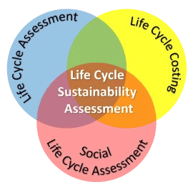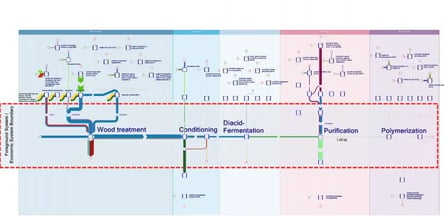How a waste product like pentose wood sugars is transformed into bioplastic and can be used as a new resource for plastic coatings and packaging.
So called 1st generation biofuels are based on materials such as corn, sugar cane, wheat or rapeseed. They are thus based on the same resources that are also important for food production. If such biofuels are produced on large scale, the consequence could be increasing prices for these resources. Instead, 2nd generation approaches try to develop renewable economies that do not rely on edible resources but identify other areas such as crop residues, wood or waste fractions for feedstock. In the BioREFINE-2G project the project partners investigated the technical feasibility of using waste streams from the Borregaard wood refinery in Norway as a resource for bioplastics. As part of this project, the ifu Hamburg-Team performed a life cycle sustainability assessment. The assessment revealed important hot spots for future research and development which need to be addressed to allow this new production pathway to become more sustainable.
The project: Turning waste from bioethanol production into a resource for bioplastic
BioREFINE-2G is an international and transdisciplinary EU-funded project, which aimed at turning waste streams from the Borregaard wood refinery into a new resource. Borregaard has over 100 years of experience in using wood components, from fine paper production based on cellulose up to the production of bioethanol based on hemicellulose and wood sugars. However, pentose wood sugars so far represent a waste stream in the bioethanol production. The bioREFINE-2G project investigated the technical feasibility of making use of this unexploited pentose sugar. For this purpose, “smart”, genetically modified yeast was developed, which can process pentose sugar and convert it into dicarboxylic acid. This dicarboxylic acid was then treated further to produce bioplastic, which can be used e.g. for plastic coatings and packaging. In this way, a former waste product was transformed into a new resource!
ifu’s share: Identifying hot spots on the way towards sustainability
 The ifu-Team contributed to this project with a life cycle sustainability assessment (LCSA). An LCSA comprises all three sustainability dimensions: economic, environmental and social. Since no industrial data for the production process of bioplastic was readily available yet, the team used a combined approach based on lab data, generic datasets and data from literature to assess the economic and ecologic dimensions. The social dimension was assessed qualitatively using questionnaires in accordance with the Guidelines of UNEP/SETAC. This assessment allowed to identify potential hot spots limiting sustainability.
The ifu-Team contributed to this project with a life cycle sustainability assessment (LCSA). An LCSA comprises all three sustainability dimensions: economic, environmental and social. Since no industrial data for the production process of bioplastic was readily available yet, the team used a combined approach based on lab data, generic datasets and data from literature to assess the economic and ecologic dimensions. The social dimension was assessed qualitatively using questionnaires in accordance with the Guidelines of UNEP/SETAC. This assessment allowed to identify potential hot spots limiting sustainability.
Result: More research and development is needed!
The bio-REFINE-2G project successfully developed and tested genetically modified yeast which is able to process pentose sugar. Moreover, bioplastic material was successfully produced. However, the single production steps could not fully be coupled yet and the overall process showed a large carbon footprint due to high energy and auxiliary demands at this current development stage of the process. The LCSA revealed central anchoring points for future research, which need to be tackled if this production process is meant to become a sustainable alternative to existing production pathways for plastic materials. One hotspot for future research is the type of plant biomass which is most sustainable at a production site (e.g. regarding local availability as well as suitability for later treatment steps). Further hotspots comprise the high demand of water in first production steps as well as the high amount of chemicals needed in later purification steps. The analysis of the social dimension already showed good performance at the project site in Norway.
Challenges & opportunities – designing for sustainability from the start
Opening up new production pathways which turn former waste materials into new resources will represent an important component to make economy more sustainable and enable circular economy. However, new production pathways from waste materials are not necessarily sustainable, e.g. if the new pathway causes high processing demands. Therefore, it is important to tackle hot spots which limit sustainability at an early development stage of new production pathways. Life Cycle Sustainability Assessment is a powerful approach to identify such hot spots on the way towards a sustainable circular economy.

About the authors: Jana Hinners and Martina Prox
Jana Hinners just finished her PhD in Biology at the University of Hamburg and starts as a Postdoctoral Researcher at the University of Edinburgh soon.
Martina Prox is an expert for sustainability strategy at ifu Hamburg, Member of the iPoint Group. For more than 20 years she has been engaged in the topics of sustainability and resource efficiency.





